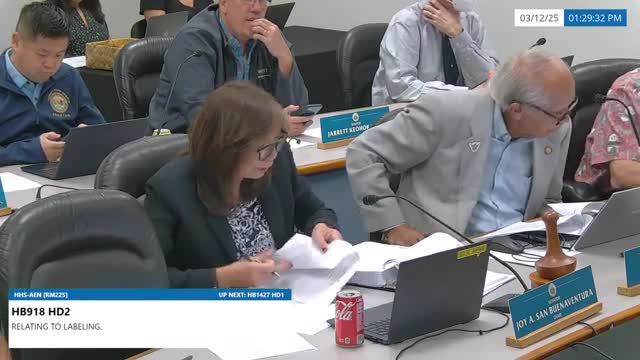Committees back labeling bill for wipes, but DOH warns enforcement and staffing needed
Get AI-powered insights, summaries, and transcripts
Subscribe
Summary
HB918 would require non‑flushable labeling for wipes; industry and wastewater stakeholders largely supported the measure, while the Department of Health urged funding for outreach and enforcement positions.
The joint Senate hearing heard broadly favorable testimony on HB918, a bill that would require certain wipes be labeled "non‑flushable." Industry groups, wastewater professionals and environmental advocates described the measure as a practical step to reduce sewer and treatment plant blockages.
Wes Fisher of the Association of the Nonwoven Fabrics Industry told senators the bill mirrors legislation already adopted in several states and represents cooperation between the wastewater industry and wipes manufacturers. "This legislation ... has passed in seven states to date," Fisher said, adding that most wipe products on U.S. shelves are already labeled non‑flushable.
Department of Health witnesses supported the intent but warned the state needs capacity to enforce labeling and run public education campaigns. "If it's gonna be a statewide requirement, it requires states to have levels of effort to be able to enforce it, do outreach," Matt Carano of DOH Environmental Health Services said; DOH asked the committee to consider funding positions for outreach and coordination with counties.
Why it matters: Wipes described as "flushable" in some marketing have been linked to sewer blockages and "fatbergs" in wastewater systems. Supporters said labeling reduces confusion and helps counties protect sewer infrastructure.
Outcome: Committee chairs recommended passing HB918 with technical amendments, delaying the effective date to provide time for implementation, and recording a DOH request for funding (committee report to note a proposed $100,000 and two FTEs for outreach and limited enforcement). Senators voted to adopt the recommendation, with some members reserving on financing.
Ending: Witnesses emphasized education and county cooperation for outreach. DOH said counties ultimately operate wastewater plants and that state funding would support statewide outreach and coordination rather than house‑to‑house enforcement.
